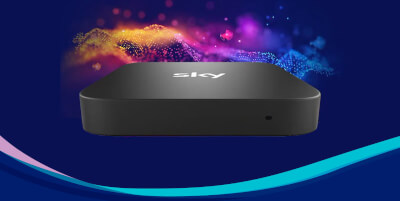Sky Q vs Sky Stream 2024: Which is better?
 Dan Howdle • November 29th, 2024
Dan Howdle • November 29th, 2024

NOTE: Sky Q is no longer available to new customers. All new Sky TV deals are on Sky Stream or Sky Glass and operate via the internet, not requiring a satellite dish. This page will remain here for the purpose of lagacy information for now.
Enter Sky Stream, Sky's latest subscription TV solution, which with its bite-sized Sky Puck box requires only an internet connection. It's plug and play and offers most of what Sky Q does. However there are some important differences that make the comparison worth talking about. And which one of these services is the right one for you will depend on what you intend to do with it. Let's compare the two.
Overview
Sky Q is a large set-top box you'll need to find pace for under your TV, and you'll need both a satellite dish and a reasonably fast internet connection for it to function. On the plus side, there are more channels on offer with Sky Q – though many of those missing on Sky Stream will be irrelevant to most – and of course you can record live TV, something you simply cannot do with Sky Stream.
Sky Stream on the other hand comes in a box so small you could feasibly tuck it behind even a wall-mounted TV, it doesn't require a satellite dish and offers most of the channels Sky Q does. Notable omissions are individual subscription channels such as MUTV, and of course you cannot record live TV as it doesn't have a hard drive. This latter omission is somewhat mitigated both by the fact you can watch most of its content on catch-up whenever you want, and even earmark certain shows to watch later.
Side-by-side comparison
Here's a quick and easy glance of what the boxes and the services themselves include, side-by-side for easy comparison:
| Sky Q | Sky Stream | |
|---|---|---|
| Channels | 200+ [list] | 150+ [list] |
| Resolution | (Up to) 4K Ultra HD with HDR | (Up to) 4K Ultra HD with HDR |
| Sound Technology | (Up to) Dolby Atmos | (Up to) Dolby Atmos |
| HDMI Version | HDMI 2.1 | HDMI 2.1 |
| Network Connection | Dual-band Wi-Fi | Dual-band Wi-Fi |
| Remote Control | Voice remote control | Voice remote control |
| Record & Store live TV | Yes | No |
| Stream live TV | Yes | Yes |
| Delivery | Satellite dish | Internet streaming |
| Dimensions | 33.6 x 25.3 x 6.6 cm | 14.6 x 9.5 x 5.4 cm |
| Warranty | One-year | One-year |
| Colour | Black | Black |
Pricing and packages
Apart from the features listed above, the exact make-up an pricing of individual packages is something worth considering when comparing the two. Broadly speaking, Sky Stream is a bit cheaper than Sky Q. Which makes sense when you consider that as well as the convenience of not having to have an engineer come round and bolt a satellite dish to your house, you don't have to pay for that either.
And Sky is actively pushing customers away from Sky Q at the time of writing, since it is slowly but surely attempting to phase out its entire satellite offering. You won't hear any major announcements from Sky that it's doing this, but take it from us – its Stream products are getting all the limelight recently, so you actually need a pretty good reason, and be pretty diligent, if you still want to get satellite TV. Here's a quick glance at a selection of the latest TV deals from Sky:
-
 Stream + Ultimate TV + Netflix
Stream + Ultimate TV + Netflix- 150+ channels
£22.00 per month(prices may change during contract)£0 one-off cost24 month contract -
 Stream + Essential TV + Sports + Netflix
Stream + Essential TV + Sports + Netflix- 110+ channels
£35.00 per month(prices may change during contract)£0 one-off cost24 month contract -
 Stream + Ultimate TV + UHD & Dolby Atmos + Sports + Netflix
Stream + Ultimate TV + UHD & Dolby Atmos + Sports + Netflix- 150+ channels
£46.00 per month(prices may change during contract)£0 one-off cost24 month contract
Convenience
We reckon you'd have to be arguing dishonestly to pretend Sky Stream isn't the more convenient solution of the two. Sure, there's an argument to be made that being able to record and store whatever you like (with Sky Q) trumps all, and that will certainly be true for a small minority of customers. However, other factors will be more important to most.
Here's a quick look at Sky Q and Sky Stream from the point of view of convenience:
- Record up to 1,000 hours on Sky Q – The Sky Q box has either a 1TB or 2TB hard drive inside it, the latter size allowing you to record up to 1,000 hours of SD content. Of course, most recordings will be in HD, which will halve that estimate. You can record up to six shows simultaneously and watch a seventh. That's pretty convenient
- No satellite dish on Sky Stream – This is a big one. Only an internet connection required, which can be delivered via wifi. That's a lot less mess and fuss, and you won't even need an engineer visit let alone half a dozen cables and a dish attached to your home
- More channels on Sky Q – Yes, there are 50-60 more channels on Sky Q than are currently available on Sky Stream, but many of those are +1 (time shifted) channels you don't need with Stream, and all channels on Sky Stream are in HD
- Sky Q is huge compared to Sky Stream – When put side-by-side the two boxes couldn't be more different. The Sky Q is almost absurdly large compared to the Sky Stream Puck because it needs to function as a recorder as well as a streaming box
Our friendly Sky experts are here to help you. We're open Monday to Sunday 8am-8pm.
Call now on 0333 210 1128Apps and other features
Here we'll take a broad look at the apps and other features you'll find (or not find) on both platforms.
Apps
Apart from live TV and catch-up, you can also download a wide range of popular apps onto both the Sky Q and Sky Stream. The current crop at the time of writing include:
Terrestrial apps:
- All4
- BBC iPlayer
- ITVX
- STV Player
On-demand streaming:
- Apple TV+
- Discovery+
- Disney+
- GolfPass
- Lionsgate+
- Netflix
- Paramount+
- Peacock
- Prime Video
- Red Bull TV
- YouTube
- YouTube Kids
Music
- Amazon Music
- BBC Sounds
- Global Player
- Radio Player
- Spotify
- Vevo
- XITE
Other
- Fiit
- Highbrow
- Peloton
- Sky News
- Tastemade
- Weather
One particular oddity of note is that you will never have to download any of these apps, they will be automatically installed on whichever box you choose, and updated whenever required. Any new apps will also be automatically downloaded and installed as and when they appear.
Call now and switch to a better Sky deal. We're open Monday to Sunday 8am-8pm.
Call now on 0333 210 11284K HDR and Dolby Atmos
Both the Sky Q bo and the Sky Stream puck come with these magical technologies available. But what are they and what do they do? Because honestly, in both cases it may not be what you think.
4K HDR
Most will understand that 4K means four thousand (hence the K) pixels across. It's a way to measure resolution. The higher the resolution, the clearer and more detailed the image (to a point, the human eye is only so capable, and 8K, which you may also have heard of is, for this reason totally pointless). 4K has four times the detail of HD. But, you'll need a 4K TV to take advantage, obviously.
HDR on the other hand stands for High Dynamic Range, with refers to the difference between the brightest capability of the screen versus how deep the blacks are that the TV can produce. In theory HDR should produce a deeper, more realistic, more contrasty image, but in practice this is often not the case. There is no agreed standard or way for the content being played to know how bright or dark your TV can go, and so often the result it just an image that's dimmer. When it works it's spectacular, but it can be a bit hit and miss unless you're willing and able to deep-dive into your TV settings.
Dolby Atmos
You've no doubt seen this plastered on a lot of tech these days, from soundbars to TVs to phones. But here's the problem: Dolby Atmos is basically surround sound that also has 'height' channels. The get true Dolby Atmos you literally need speakers on your ceiling. Soundbars claiming Dolby Atmos aren't delivering anything like it, they're 'faking' it through audio manipulation.
If you've got speakers on or in your ceilings being powered by a Dolby Atmos AVR, then sure, you can get excited about Dolby Atmos but honestly, for more people, it's not something you should concern yourself with. It's a real technology with real benefits, but for 99.9% it boils down to a marketing buzzword to sell hardware.
-
 Stream + Ultimate TV + Netflix
Stream + Ultimate TV + Netflix- 150+ channels
£22.00 per month(prices may change during contract)£0 one-off cost24 month contract -
 Stream + Essential TV + Sports + Netflix
Stream + Essential TV + Sports + Netflix- 110+ channels
£35.00 per month(prices may change during contract)£0 one-off cost24 month contract -
 Stream + Ultimate TV + UHD & Dolby Atmos + Sports + Netflix
Stream + Ultimate TV + UHD & Dolby Atmos + Sports + Netflix- 150+ channels
£46.00 per month(prices may change during contract)£0 one-off cost24 month contract
What we think
If you want a box you can store five years worth of Eastenders on, then honestly the Sky Q is the only game in town – besides Virgin Media's similarly specced TV Box 360, that is. However, in all other ways, Sky Stream and the Sky Stream Puck win hands down.
Sky Stream is cheaper, much, much smaller, easier to use, much easier to install, doesn't require an engineer visit or a satellite dish stapled to your house. It's no wonder Sky is promoting Sky Stream over Sky Q nowadays. It's better for almost everyone. And to put it bluntly, big recording boxes like Sky Q are very much on their way out.
